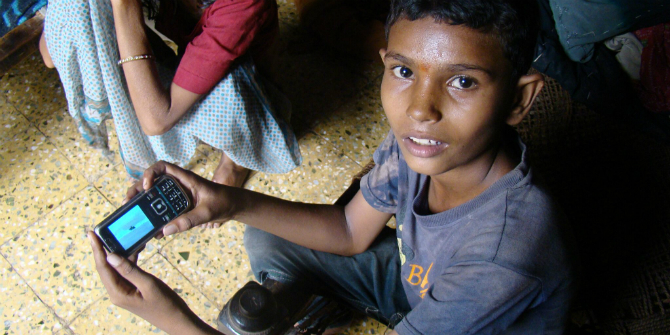 Children are often more digitally skilled than parents realise and learn both from observing other family members and from developing their own strategies. Yet parental attitudes still deeply influence children’s levels of digital literacy and parents tend to have a more positive view of digital technology if schools meaningfully integrate such technologies into children’s learning. These are some of the findings from a major Europe-wide European Commission study of children’s media practices presented here, during Global Media and Information Literacy Week 2018, by Stéphane Chaudron and Rosanna Di Gioia. Stéphane researches young digital citizens’ security and safety at the Joint Research Centre of the European Commission (JRC) and Rosanna is a researcher in the JRC Cyber and Digital Citizens’ Security Unit. [Header image credit: M. Stewart, CC BY-SA 2.0.jpg]
Children are often more digitally skilled than parents realise and learn both from observing other family members and from developing their own strategies. Yet parental attitudes still deeply influence children’s levels of digital literacy and parents tend to have a more positive view of digital technology if schools meaningfully integrate such technologies into children’s learning. These are some of the findings from a major Europe-wide European Commission study of children’s media practices presented here, during Global Media and Information Literacy Week 2018, by Stéphane Chaudron and Rosanna Di Gioia. Stéphane researches young digital citizens’ security and safety at the Joint Research Centre of the European Commission (JRC) and Rosanna is a researcher in the JRC Cyber and Digital Citizens’ Security Unit. [Header image credit: M. Stewart, CC BY-SA 2.0.jpg]
In response to the question, “Do you have any digital technology tips that you would like to share with other parents?” a Portuguese father, aged 43, replied, “I guess everybody is looking for that answer.”
Taking care of the digital life of our little darlings is not a straightforward task. Parents tend to draw upon their own childhood experiences as a reference for parenting decisions, but dramatic changes within the media landscape and media usage has made this more difficult when it comes to technology.
A new JRC study on the use of digital technologies by young children in the home has found that the majority of parents said that they would welcome more guidance on how to support the development of their children’s use of digital devices. It has also highlighted the importance of parents as role models in developing children’s digital competences, including auto-regulation and critical thinking. Further, it stressed the importance of taking the time to enter our children’s digital worlds, explore with them and help them make the most of their digital experiences.
Children’s digital behaviours mirror their parents
“They learned how to use digital media by watching us – one or two times was enough,” a Cypriot father.
The study, which involved interviews with 234 families in 21 countries, showed that children’s digital skills develop from a very young age, mostly at home, and are gained from observing and mirroring parents’ and older siblings’ behaviour.
“So, this is funny. Honestly, the boy can’t read, he can’t write, how does he know this is YouTube? … I asked him and he said: ‘Mum, you’re dumb! You go here, push here and watch it there…’ He says he sees according to the images,” a Portuguese mother about her 7-year-old son.
Even if they have not yet mastered reading and writing, children develop their own strategies based on images and sound recognition and using technology such as text auto-completion or voice recognition. They do this – most of the time individually and autonomously – through trial and error, and not without risk. But by doing so they develop skills and are often more skilled and knowledgeable than their parents realise. In fact, it seems that the more they use digital technology the more they learn, although they also benefit from grown-ups’ help to increase their range of digital skills, including critical thinking and creativity.
Children’s online life: not only YouTube and GooglePlay
“My favourite hobbies are watching videos on YouTube, especially watching dance videos or videos about how to make bracelets but I always have to ask my mum,” a Spanish girl, aged 6.
The study highlights that for young children, digital technology is used for four main purposes: (1) leisure and entertainment, (2) information and learning, (3) creation, (4) communication.
According to the children’s accounts, they mainly use digital technology to watch videos and games on YouTube and Google play. But this is not all they do. They also use search engines to get information on things they are interested in, fuel their imagination and creativity and support their school activities. Importantly, use of digital technology is more likely to be encouraged by parents if it is explicitly requested by schools themselves and parents are more aware of what their children are learning from it.
The study showed that a minority of children are social networkers as early as the age of six. The majority of these young users are invited by their parents to join family accounts under supervision. But others adopt social networks because of peer pressure or join online groups based on common interests. Some parents mediate their use and accompany their children online but others are not aware of the pitfalls and leave their children free to explore the tools alone.
Finally, while only some of the children are digital creators, all of them shared an interest in this, and benefited, at least initially, from being taught how to create content.
Parents as role models for digital technology
Parents’ attitudes towards digital technology influence the strategies they adopt towards their children’s use of digital tools, and thus shape their children’s digital skills. Most parents see the digital revolution as inevitable, useful but challenging. The majority believe that mastering digital technologies and developing digital skills are fundamental for their children’s development. However, they are sometimes challenged by digital technology themselves and by their children’s use of digital devices.
“We have seen that parents try to balance and safeguard their children’s digital engagement more or less successfully. Parental strategies for children’s use of digital devices – open, permissive, supportive, restrictive or ‘laissez faire’ – rely on numerous interlinked factors, from the parents’ skills, knowledge, attitudes and perceptions towards digital technologies to their personal experiences and socio-economic background,” explains JRC researcher Stephane Chaudron.
The study finds that parents take advantage of digital technology to calm down or involve children in ‘safe’, quiet activities while outside of the house or when they themselves are busy with household duties.
“I only give [my smartphone] as an SOS! […] Look, when we are at a restaurant with friends, and the kids are completely hysterical, and we have tried everything else, I give it to [my children] to keep them entertained. It’s when we have used all the other resources,” a Portuguese father.
Most of parents struggle to understand where the line lies between constructive use of digital technologies that support their child’s learning, and unhealthy use of these devices.
Parents who are the least knowledgeable about such technology tend to restrict their children’s access to it the most. They fear possible negative effects on eyesight, concentration, cognitive capacities and social behaviour – fears that are only partially related to real risks. But children are quick to break the rules whenever they can.
“When I say you cannot use it for longer than half an hour, I only make it more interesting [to them],” a Dutch mother.
Parents with high levels of digital skills are more likely to support their children’s use of digital technologies and to use them together with their children. They are more at ease as they know the technology, its potential, its pitfalls and are comfortable enough to guide them. Children benefiting from such support seem to acquire a larger range of digital skills, including relating to safety and critical thinking.
Another factor seems to support the acquisition of more skills: meaningful integration of digital activities with school activities.
Schools are instrumental in promoting healthy and meaningful use of digital devices
“At the end of the day, what is literacy today? Is it defined by signing one’s name or being able to obtain information from the available media? […] Skilled use of digital devices is very important for [my son’s] future,” a Croatian father.
Some parents believed that schools are in a position to provide the guidance they need and are key to developing the digital skills that their children need. Parents tended to support their children’s digital learning opportunities more and have more positive view of digital technology if schools meaningfully integrated such technologies into homework activities.
Based on sample studies from different EU countries, the JRC study confirms that schools can have a major influence on the acquisition of digital competences – including creative use – when digital technologies are integrated as active learning tools, as opposed to mere sources of information.
Developing digital competence at primary school level can also help raise awareness of safety issues and build critical thinking among children regarding content and devices that they use.
This post gives the views of the authors and does not represent the position of the LSE Parenting for a Digital Future blog, nor of the London School of Economics and Political Science.





